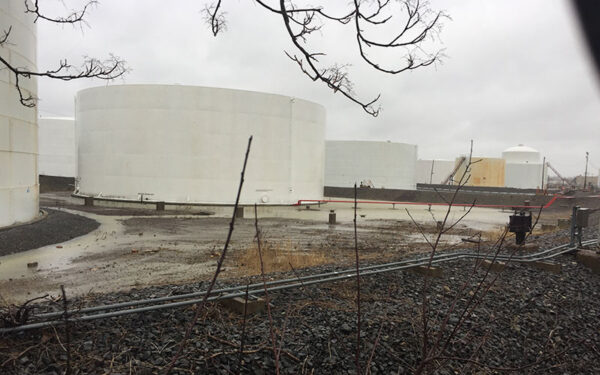
A field with solar panels, a way to produce renewable energy that can move us off fossil fuels at the root of climate change. Photo: Shutterstock.
On the day I’m writing this, dirty gas fuels 65% of our region’s electricity. Barely 6% is coming from renewable sources.
That’s a huge problem.
We know we’re facing a crisis harming our communities and the world around us: climate change. And to fix this problem, we must address its roots by drastically curbing our use of dirty fossil fuels. Transitioning our economy to clean, renewable sources is one way we can do so.
Leaders in New England states have already taken steps to boost clean energy. But a secretive entity that controls everything about how we receive our energy and how much it costs stops us from moving forward. This entity is called ISO-New England (ISO). And its antiquated thinking keeps us tied to dirty fossil fuels, holding us back from attaining a healthy and safe future.
Now, all six New England states have come together to push forward a new vision for our electricity grid – one that can support our clean energy movement.
A Peek Behind ISO’s Curtains
ISO operates New England’s electricity grid. It controls the flow of electricity across the region. Our grid operator states that it has three roles: making sure the lights stay on, keeping electricity prices low, and planning the future of the region’s electric system.
Those roles give ISO tremendous power – no pun intended – over the fuel sources that provide our electricity. ISO runs the wholesale markets through which electricity sources (a gas-fired power plant or a wind or solar array, for example) sell their power to distributors, like Green Mountain Power or Eversource. Those distributors then sell that electricity to all of us.
Because ISO controls the region’s electricity markets, it can incentivize the prevalence of some energy sources over others. That means it has immense potential in supporting New England states’ climate policies, including recently passed laws mandating drastic cuts in climate-damaging emissions. However, our grid operator refuses to consider climate change in how it runs its energy markets. Instead, its markets continue to favor dirty, polluting fossil fuels.
In other words, our regional energy grid operator puts clean energy, like solar or wind, at a disadvantage because it doesn’t view addressing the climate crisis as core to its mission. That’s largely why nearly two-thirds of our electricity today is sourced from dirty gas plants.
Not to mention, decision-making at ISO is opaque and inaccessible, even to experienced policy nerds like those of us at CLF. Closed-door executive and board meetings and highly technical analyses make it difficult to understand what’s happening to energy before it reaches our homes. It’s also made it challenging to push ISO to change.
Coming Together for Change
ISO’s historically secretive, hidden ways have long drawn strong criticism from New England state leaders, CLF, and other advocates. We all agree that ISO must be a partner – not a hindrance – to reach net-zero emissions by 2050.
That’s why, in October 2020, the six New England states joined together to release a Vision Statement for ISO to advance a healthy, equitable future through clean energy. The states called for modifications to how our grid operator works, from its mission statement and absence of climate action to its board’s decision-making processes.
This past June, the states released a follow-up report calling for further changes to how ISO works. They ask ISO to adopt much-needed changes to make its operations more transparent and ensure that all of us, the people whose energy is affected by these decisions, can voice what’s most important to our communities.
Of critical importance in these latest recommendations is a call for increased acknowledgment of environmental justice. Our frontline communities, especially, bear the heaviest burden of climate impacts. They will also shoulder the weight of outdated fossil fuel dependence. Fossil fuel infrastructure that both produces and transmits energy to our homes puts our neighborhoods’ public health at risk by polluting our air and water. Often, these are disproportionately sited in our most marginalized communities.
This need for environmental justice is just one of the reasons why the states want ISO to publish more accessible summaries of key issues without relying on technical language. Such reforms can make it easier for the neighborhoods most affected by climate change to understand our grid operator’s decisions. And while we have much more work to do in environmental justice, the states take one small step forward by also calling for a way to involve these communities in the conversation through a stakeholder group.
And ISO Still Need More Reforms
Our current electricity markets and transmission planning processes are also deeply flawed. Electricity markets are where the energy we use every day is bought and sold. Transmission is how that energy moves from where it’s produced, such as wind farms, to our homes and businesses (think transmission poles and wires).
In their June report, the states ask ISO to continue developing its long-term transmission planning studies through 2050. This planning seeks to understand how to expand our energy systems to incorporate renewable energy at scale. But, they fail to call for much-needed reforms to transmission planning, like how to share the costs of upgrading regional transmission infrastructure between states and their residents. The main benefit of these reforms would be greater access to renewable energy that provides a cheaper form of electricity and slashes climate-damaging emissions to help the five New England States with climate mandates meet them.
The states also miss an opportunity to call for the elimination of the Minimum Offer Price Rule. This rule makes renewable resources unfairly expensive in the wholesale energy markets that ISO runs – keeping us locked into dirty, climate-damaging energy sources.
These transmissions and markets choices ultimately trickle down to the consumer, unfairly affecting the type of electricity that powers our homes and businesses and how much it costs.
What Inhibits the Power of Collaboration?
CLF has been pushing to reform ISO’s operations and boost clean energy. Many of the recommendations from the New England states’ vision are strong and long overdue. And while several other recommendations don’t go far enough, in the end, the power of our collective climate action dwindles unless ISO reforms its practices.
This is a movement for the people we love, the health of our environment, and the safety of our future. It’s a movement that we won’t allow ISO to hold back anymore.



